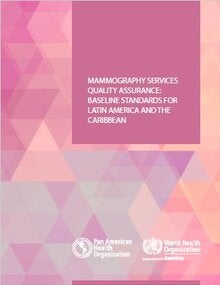Overview
Early detection for breast cancer, linked to appropriate and timely treatment, can significantly reduce mortality.Mammography is the most effective proven imaging technology for breast cancer screening, and is also used as a diagnostic tool for symptomatic patients or those with a positive screening mammogram.
This manual on Mammography Services Quality Assurance: Baseline Standards for Latin America and the Caribbean is a guidance document for public health professionals, health authorities, and radiology personnel working in breast cancer screening programs and mammography services. The aim of this manual is to provide baseline standards on mammography quality assurance, in order to increase access to quality services, while ensuring patient and public safety.
This guide is intended for use in public and private health systems where mammography services are established, or are in the process of being established. It has been developed to complement the WHO Position Paper on Mammography Screening (WHO, 2014) although the information in this document is equally applicable to screening and diagnostic mammography services.
This manual includes general information on how to plan and implement a mammography quality assurance program, with specific reference to standards, indicators, human resource requirements, and equipment requirements. A bibliography with more extensive references on mammography quality assurance is provided at the end of this manual.
|

